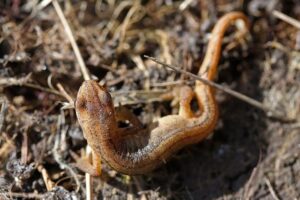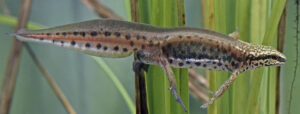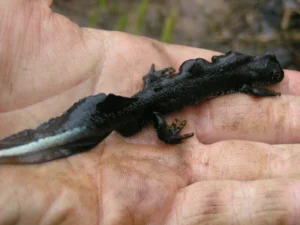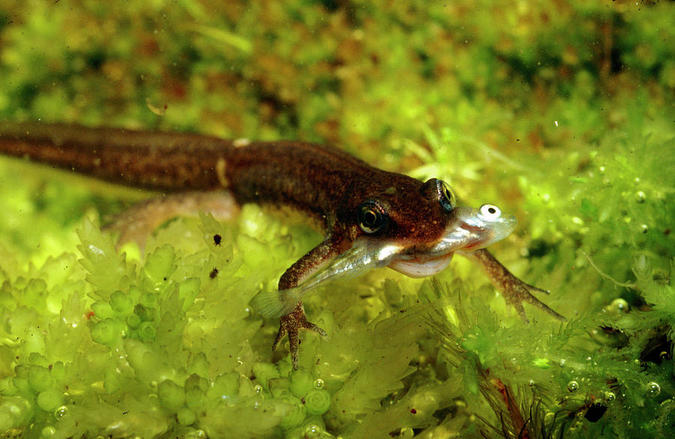On a damp evening, you might spot a small creature slipping under the leaves or swimming quietly in a pond. Its skin looks smooth, and its movements are slow but deliberate. You might wonder: are British newts poisonous?
Yes, British newts make toxins, but they mostly use them to protect themselves from predators. Handling them carelessly can be risky, so it’s best to admire them without touching.
Newts are delicate creatures that rely on their slimy skin to survive. Their bodies hold special chemicals that can make birds, mammals, or fish think twice before eating them. Still, these chemicals usually do not kill humans, though they can irritate your skin or eyes.
Why Do Newts Have Poison?
Newts are small and slow. They cannot run fast or hide in tall grass like frogs. Their main way to stay safe is through chemicals in their skin. These toxins taste bad and can make predators sick if eaten.
Some newts even have bright colors to warn predators. For example, the smooth newt can turn orange or red on its belly. This is like a natural warning sign painted right on its skin. It tells animals: “I’m not a good meal.”
Which British Newts Are Poisonous?
In the UK, there are three main newt species:
-
Smooth Newt: Most common, slim, with an orange belly. Produces skin toxins.

-
Palmate Newt: Smaller than smooth newt. Males grow webbed back feet in breeding season. Toxins are mild.

-
Great Crested Newt: Largest and rarest, with warty skin and bright orange belly. Most toxic of the three.

Even though they are poisonous, the toxins are usually not harmful to humans if you just look at them. Skin contact might cause irritation, so washing hands afterward is important if you ever touch one.
How Do They Use Their Poison?
Newts do not bite or chase predators. Their poison works when a predator tries to eat them. Birds, fish, and small mammals might spit the newt out after tasting it. Some predators learn to avoid newts completely because of this bitter experience.
Some newts also release extra toxins if they feel threatened. This can leave a slimy coating that smells bad and keeps attackers away. It’s a clever defense, especially for slow-moving animals that cannot escape quickly.
Can Humans Be Harmed?
For humans, newt poison is usually not dangerous. Still, it can irritate skin, eyes, or mouth. Children or pets who try to eat them could feel sick. That’s why it’s better to enjoy British newts from a distance and avoid picking them up.
Handling them also stresses the newts. Their skin is very delicate and full of moisture. Oils or soaps from human hands can damage this protective layer, making it harder for the newt to survive in its wet environment.
How to Safely Watch Newts
If you want to see newts in the wild, here are a few tips:
-
Visit ponds, ditches, or damp woodland after rain.
-
Look under logs or leaves carefully without moving them too much.
-
Watch quietly from the edge of water. Newts often swim slowly near the surface.
-
Avoid touching them unless necessary for research or rescue, and always wash hands afterward.
Being patient and quiet is the best way to enjoy these secretive creatures. They are fascinating to watch, especially during breeding season when males display wavy tails and bright colors.
Why Newt Poison Matters in Nature
Newts are an important part of the food web. Their poison helps balance predator populations. Birds and mammals that cannot handle the toxins learn to avoid them, which indirectly protects other small creatures in the pond.
Some studies suggest newt toxins can even influence fish and invertebrate behavior. Predators that taste newts may change where they hunt, affecting the whole ecosystem. In this way, newts are small but powerful players in their environment.
What to Do If You Find a Newt
If you come across a newt in your garden or pond:
-
Observe it without touching.
-
Keep pets away.
-
Make sure it has clean water and shelter if you have a pond.
-
If the newt looks sick or trapped, gently move it with gloves and return it to water or damp shelter.
Remember, newts are protected in the UK under the Wildlife and Countryside Act. It is illegal to harm, disturb, or sell them. Respecting their habitat helps them survive.
Are All Newts Poisonous the Same Way?
Not all newts have the same level of toxins. The great crested newt is the most poisonous of the UK species. Smooth and palmate newts are milder but still carry chemicals strong enough to keep predators away.
Some amphibians around the world are far more dangerous, but British newts rely on small chemical defenses instead of extreme venom. This makes them safe for humans to enjoy, as long as we respect their space.
Conclusion
British newts are poisonous, but mostly in ways that protect them from predators. They do not attack humans, and their toxins are usually mild. Still, touching them can irritate skin and stress the animal.
The next time you see a newt gliding through a pond, pause and watch. Appreciate this small creature with a big defense system. Their colors, movements, and secret chemicals tell a story of survival in a wet, unpredictable world.
Hi, my name is Ezra Mushala, i have been interested animals all my life. I am the main author and editor here at snakeinformer.com.

